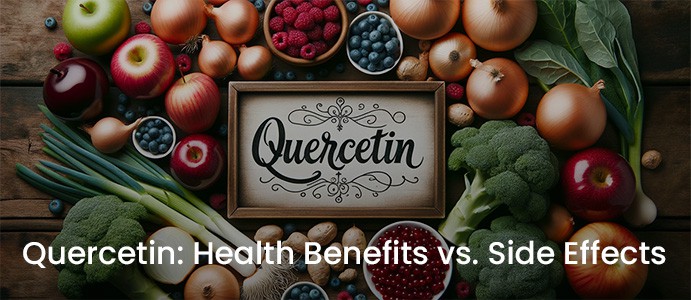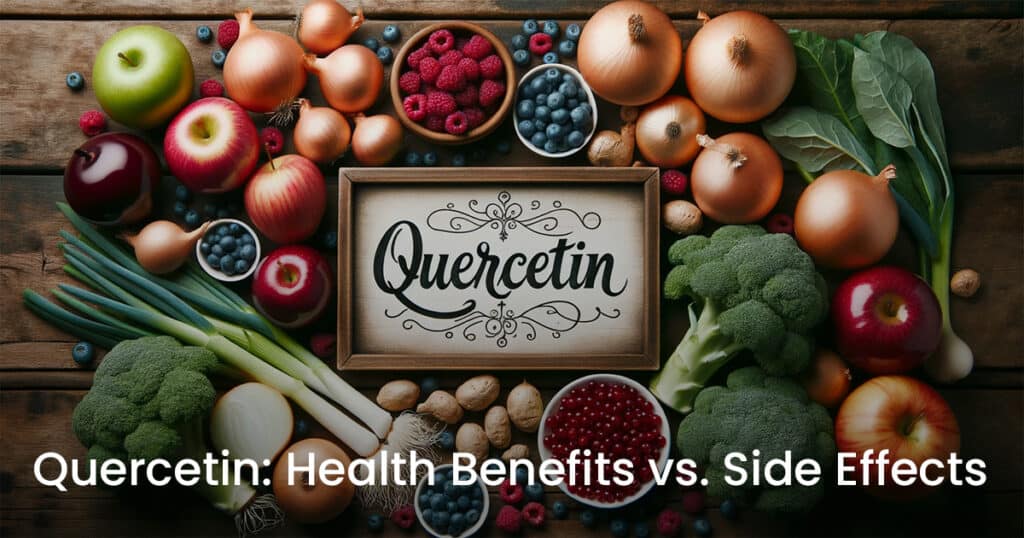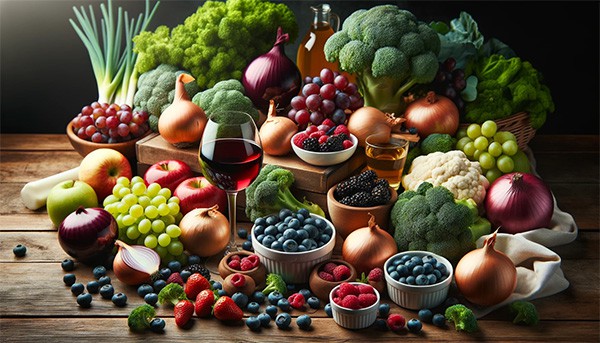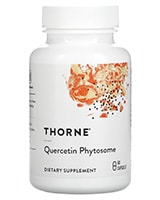

1. Introduction and Overview of Quercetin
Quercetin, classified as a flavonoid, is a polyphenolic compound ubiquitously present in various plant sources, including fruits, vegetables, grains, herbs, and spices. Notably, herbs such as turmeric and ginger also contain quercetin. This compound has been the focal point of numerous scientific investigations due to its potential therapeutic properties, which encompass antioxidant, anti-inflammatory, and antiviral activities. Its presence in a wide array of plant-based foods and its potential health implications underscore its significance in both nutrition and medicine.
2. Sources of Quercetin
Food High in Quercetin
The quercetin content in foods is influenced by several factors, including plant variety, environmental growing conditions, and specific preparation methods. Some representative sources with notable quercetin concentrations include:

- Onions: Among the varieties, red onions typically have a higher quercetin content compared to yellow ones[1]Kwak, J.-H., Seo, J. M., Kim, N.-H., Arasu, M. V., Kim, S., Yoon, M. K., & Kim, S.-J. (2017). Variation of quercetin glycoside derivatives in three onion (Allium cepa L.) varieties. Agricultural and Food Chemistry..
- Apples: The skin of apples is particularly rich in quercetin[2]Healthfully. (n.d.). How Much Quercetin Is in an Apple? Retrieved from https://healthfully.com/547922-how-much-quercetin-is-in-an-apple.html.
- Berries: Varieties such as blueberries and blackberries are good sources[3]Livestrong. (n.d.). Foods With the Highest Content of Quercetin. Retrieved from https://www.livestrong.com/article/301326-foods-with-the-highest-content-of-quercetin/.
- Grapes: Red and black grapes are especially quercetin-rich[4]Grapes from California. (n.d.). Freeze-Dried Table Grape Powder Overview. Retrieved from https://www.grapesfromcalifornia.com/wp-content/uploads/2021/10/2021101019-freeze-dried-table-grape-powder-overview-2022-23.pdf.
- Broccoli: The florets of broccoli generally contain a more concentrated amount of quercetin than the stems[5]Liu, M., Zhang, L., Ser, S. L., Cumming, J. R., & Ku, K.-M. (2018). Comparative Phytonutrient Analysis of Broccoli By-Products: The nutritional importance of vegetable by-products as functional food ingredients. Agricultural and Food Chemistry. Retrieved from https://www.ncbi.nlm.nih.gov/pmc/articles/PMC6017511/.
- Teas: Both green and black teas are sources of quercetin[6]Livestrong. (n.d.). Foods With the Highest Content of Quercetin. Retrieved from https://www.livestrong.com/article/301326-foods-with-the-highest-content-of-quercetin/.
- Red Wine: The quercetin in red wine is derived from the skins of grapes.
These foods, while being sources of quercetin, also contribute a myriad of other beneficial phytonutrients to the diet, underscoring their nutritional value.
Quercetin Supplements
For individuals seeking a more potent and consistent source of quercetin, dietary supplements are available in various formulations. It’s noteworthy that many quercetin supplements on the market are often formulated with other bioactive compounds, such as bromelain or vitamin C. These combinations are believed to enhance the absorption and bioavailability of quercetin. However, prior to initiating any supplementation, consultation with a healthcare professional is imperative to ensure safety and avoid potential interactions with medications or pre-existing health conditions.
3. Quercetin Health Benefits
Quercetin’s diverse health benefits have been substantiated through rigorous scientific research, revealing its potential in various physiological domains:
Antioxidant Properties
Quercetin is a potent antioxidant that can neutralize free radicals[7]David, A. V. A., Arulmoli, R., & Parasuraman, S. (2016). Overviews of Biological Importance of Quercetin: A Bioactive Flavonoid. Pharmacognosy Reviews, 10(20), 84–89. Retrieved from https://www.ncbi.nlm.nih.gov/pmc/articles/PMC5214562/, thereby mitigating oxidative stress. Importantly, quercetin can protect against oxidative damage to vital cellular components, including DNA, lipids, and proteins.
Anti-inflammatory Effects
Chronic inflammation is a hallmark of numerous diseases. Quercetin has demonstrated the ability to modulate inflammatory pathways, potentially attenuating the release of pro-inflammatory cytokines[8]Sato, S., & Mukai, Y. (2020). Modulation of Chronic Inflammation by Quercetin: The Beneficial Effects. Pharmacognosy Reviews, 14(28), 73–78. Retrieved from https://www.ncbi.nlm.nih.gov/pmc/articles/PMC7425105/.
Quercetin for Allergies

Quercetin’s antihistamine properties can help stabilize immune cells responsible for releasing histamines[9]Mlcek, J., Jurikova, T., Skrovankova, S., & Sochor, J. (2016). Quercetin and Its Anti-Allergic Immune Response. Pharmacognosy Reviews, 10(20), 84–89. Retrieved from https://www.ncbi.nlm.nih.gov/pmc/articles/PMC6273625/, which mediate allergic reactions. Additionally, quercetin may stabilize mast cells, further reducing histamine release and alleviating allergy symptoms.
Antiviral Properties
Quercetin exhibits antiviral properties against a spectrum of viral pathogens[10]Mlcek, J., Jurikova, T., Skrovankova, S., & Sochor, J. (2016). Quercetin and its derivates as antiviral potentials: A comprehensive review. Pharmacognosy Reviews, 10(20), 84–89. Retrieved from https://www.ncbi.nlm.nih.gov/pmc/articles/PMC6273625/. Its antiviral mechanisms encompass inhibiting viral replication and reducing viral infectivity.
Quercetin for COVID
Quercetin is currently under investigation as a potential therapeutic agent for COVID-19, targeting both early and late stages of the disease[11]Sato, S., & Mukai, Y. (2020). Quercetin as a possible complementary agent for early-stage COVID-19. Pharmacognosy Reviews, 14(28), 73–78. Retrieved from https://www.ncbi.nlm.nih.gov/pmc/articles/PMC7425105/. While preliminary findings are promising, comprehensive clinical trials are essential to establish its efficacy against SARS-CoV-2.
Cardiovascular Health
Quercetin’s cardiovascular benefits include improving endothelial function, modulating blood pressure, and influencing lipid metabolism. Its combined antioxidant and anti-inflammatory attributes may underpin these cardiovascular advantages.
4. Dosage and Consumption
Quercetin Dosage
The optimal quercetin dosage can vary based on individual factors and the specific health condition targeted. While dosages in clinical studies often range from 500 to 1,000 mg daily[12]Drugs.com. (n.d.). Quercetin Uses, Benefits & Dosage – Drugs.com Herbal Database. Retrieved from https://www.drugs.com/npp/quercetin.html, adhering to label recommendations or healthcare professional guidelines is paramount.
When to Take Quercetin
For enhanced absorption, quercetin supplements are typically advised to be consumed on an empty stomach[13]Medical Health Authority. (n.d.). Quercetin On Empty Stomach – Benefits, Dosage, Precautions. Retrieved from https://medicalhealthauthority.com/info/quercetin-on-empty-stomach-benefits-dosage-precautions.html. If gastrointestinal discomfort arises, intake of food may be preferable.
Quercetin with Bromelain
The combination of quercetin with bromelain, a pineapple-derived enzyme, is believed to augment quercetin’s absorption and bolster its anti-inflammatory effects[14]Urbano, S. L. (2023). Quercetin with Bromelain: Should They Be Mixed Because of Their Benefits? HealthPlugged. Retrieved from https://healthplugged.com/mixing-quercetin-with-bromelain/.
Quercetin and Zinc
Pairing quercetin with zinc aims to leverage its synergistic effects in enhancing immune function.
Safety and Interactions
While quercetin is generally deemed safe for the majority when taken within recommended dosages, potential interactions with specific medications, including blood thinners and chemotherapy drugs, warrant caution[15]Medical Health Authority. (n.d.). Quercetin On Empty Stomach – Benefits, Dosage, Precautions. Retrieved from https://medicalhealthauthority.com/info/quercetin-on-empty-stomach-benefits-dosage-precautions.html. Prior to initiating a quercetin supplementation regimen, consultation with a healthcare professional is imperative.
5. Potential Side Effects and Precautions
Quercetin Side Effects

While quercetin is generally well-tolerated when consumed within recommended dosages, potential side effects can occur, especially with excessive intake. Some individuals might experience gastrointestinal discomfort, headaches, tingling sensations, or skin irritation. It’s crucial to monitor for any adverse reactions and discontinue use if severe side effects manifest.
Who Should Not Take Quercetin
Certain populations should exercise caution or avoid quercetin supplementation:
- Pregnant and breastfeeding women: The safety of quercetin supplements during pregnancy and lactation has not been extensively studied.
- Individuals on specific medications: Quercetin can interact with certain drugs, including blood thinners, blood pressure medications, and chemotherapy agents.
- People with kidney or liver disorders: Quercetin is metabolized in the liver, so individuals with liver disease should be cautious. Similarly, those with kidney conditions should also exercise caution due to limited data on quercetin’s effects.
Is Quercetin the Same as Ivermectin?
There’s a misconception linking quercetin and ivermectin due to their potential antiviral properties. However, they are distinct compounds with different mechanisms of action. Ivermectin is an anti-parasitic drug, while quercetin is a natural flavonoid. Any comparisons or claims should be approached with scientific scrutiny.
Quercetin for Dogs
Quercetin has been explored as a potential supplement for dogs, especially for its anti-inflammatory and antihistamine properties. It can be administered in various forms, including capsules, powder, or liquid. When using powder or liquid forms, it’s essential to mix it with the dog’s food to ensure consumption. However, dosing should be adjusted for canine consumption, and consultation with a veterinarian is essential before introducing any supplements to a pet’s regimen.
6. Additional Insights
How Long Does It Take for Quercetin to Work?
The onset of quercetin’s effects can vary based on the specific health condition being addressed and individual metabolic factors. For acute conditions, like allergy relief, some individuals might notice effects within hours. However, for chronic conditions or general health maintenance, consistent supplementation over weeks might be required to observe discernible benefits. For optimal absorption, quercetin is best taken with food.
7. Conclusion
Quercetin, a naturally occurring flavonoid, has been the subject of extensive scientific research due to its myriad potential health benefits. From its antioxidant and anti-inflammatory properties to its potential role in combating viral infections, quercetin presents a promising avenue for therapeutic applications. Its presence in a wide variety of foods, from fruits and vegetables to herbs and spices, makes it an accessible compound for many.
However, as with any supplement or dietary component, it’s essential to approach its consumption with informed knowledge. While quercetin offers numerous health benefits, it’s crucial to be aware of potential side effects and interactions, especially for specific populations or those on certain medications.
Incorporating quercetin-rich foods into one’s diet or considering supplementation should be done with the guidance of healthcare professionals. As research continues to unveil the depth of quercetin’s potential, it remains a compound of significant interest in the realms of nutrition and medicine.
Buy Quercetin Online Review Comparison Table
| Product | Company | Quantity | Price | Country | Website |
 Quercetin Phytosome | iHerb | 60 pills (250mg) | $38.00 |  Worldwide, AU | Visit Website >> |
References
| ↑1 | Kwak, J.-H., Seo, J. M., Kim, N.-H., Arasu, M. V., Kim, S., Yoon, M. K., & Kim, S.-J. (2017). Variation of quercetin glycoside derivatives in three onion (Allium cepa L.) varieties. Agricultural and Food Chemistry. |
|---|---|
| ↑2 | Healthfully. (n.d.). How Much Quercetin Is in an Apple? Retrieved from https://healthfully.com/547922-how-much-quercetin-is-in-an-apple.html |
| ↑3, ↑6 | Livestrong. (n.d.). Foods With the Highest Content of Quercetin. Retrieved from https://www.livestrong.com/article/301326-foods-with-the-highest-content-of-quercetin/ |
| ↑4 | Grapes from California. (n.d.). Freeze-Dried Table Grape Powder Overview. Retrieved from https://www.grapesfromcalifornia.com/wp-content/uploads/2021/10/2021101019-freeze-dried-table-grape-powder-overview-2022-23.pdf |
| ↑5 | Liu, M., Zhang, L., Ser, S. L., Cumming, J. R., & Ku, K.-M. (2018). Comparative Phytonutrient Analysis of Broccoli By-Products: The nutritional importance of vegetable by-products as functional food ingredients. Agricultural and Food Chemistry. Retrieved from https://www.ncbi.nlm.nih.gov/pmc/articles/PMC6017511/ |
| ↑7 | David, A. V. A., Arulmoli, R., & Parasuraman, S. (2016). Overviews of Biological Importance of Quercetin: A Bioactive Flavonoid. Pharmacognosy Reviews, 10(20), 84–89. Retrieved from https://www.ncbi.nlm.nih.gov/pmc/articles/PMC5214562/ |
| ↑8 | Sato, S., & Mukai, Y. (2020). Modulation of Chronic Inflammation by Quercetin: The Beneficial Effects. Pharmacognosy Reviews, 14(28), 73–78. Retrieved from https://www.ncbi.nlm.nih.gov/pmc/articles/PMC7425105/ |
| ↑9 | Mlcek, J., Jurikova, T., Skrovankova, S., & Sochor, J. (2016). Quercetin and Its Anti-Allergic Immune Response. Pharmacognosy Reviews, 10(20), 84–89. Retrieved from https://www.ncbi.nlm.nih.gov/pmc/articles/PMC6273625/ |
| ↑10 | Mlcek, J., Jurikova, T., Skrovankova, S., & Sochor, J. (2016). Quercetin and its derivates as antiviral potentials: A comprehensive review. Pharmacognosy Reviews, 10(20), 84–89. Retrieved from https://www.ncbi.nlm.nih.gov/pmc/articles/PMC6273625/ |
| ↑11 | Sato, S., & Mukai, Y. (2020). Quercetin as a possible complementary agent for early-stage COVID-19. Pharmacognosy Reviews, 14(28), 73–78. Retrieved from https://www.ncbi.nlm.nih.gov/pmc/articles/PMC7425105/ |
| ↑12 | Drugs.com. (n.d.). Quercetin Uses, Benefits & Dosage – Drugs.com Herbal Database. Retrieved from https://www.drugs.com/npp/quercetin.html |
| ↑13, ↑15 | Medical Health Authority. (n.d.). Quercetin On Empty Stomach – Benefits, Dosage, Precautions. Retrieved from https://medicalhealthauthority.com/info/quercetin-on-empty-stomach-benefits-dosage-precautions.html |
| ↑14 | Urbano, S. L. (2023). Quercetin with Bromelain: Should They Be Mixed Because of Their Benefits? HealthPlugged. Retrieved from https://healthplugged.com/mixing-quercetin-with-bromelain/ |

Leave a Reply